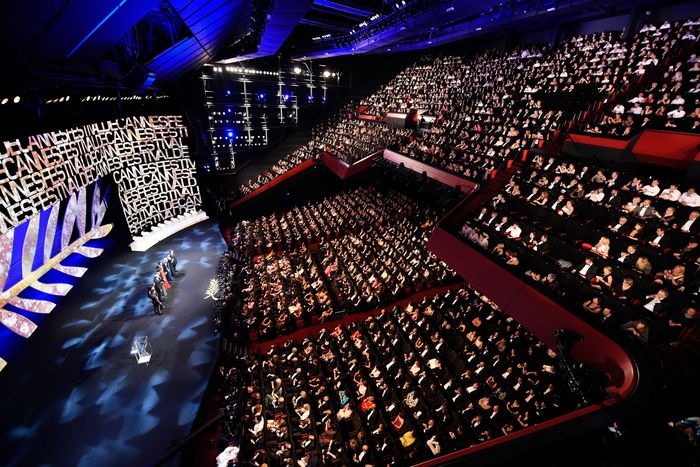
The first thing I knew about Cannes, back when I was still pronouncing the S, was the boos. Every year, reports from France told of merciless cinephiles unleashing a storm of scorn upon the unlucky films that caught their ire. Operating under a perverse calculus all their own, the jackals of the Croisette targeted not just terrible movies that deserved it, like The Sea of Trees, but worthy films that didn’t, like Personal Shopper, too. It didn’t matter how famous, or how French, you were. No one was safe.
The second thing I knew about Cannes was the standing ovations. Ten, 15, even 20-minute-long orgies of applause, during which those receiving the hosannas could do little but give bashful smiles, check their watches, and sometimes light up a smoke. Analyzing the length of each ovation became the Cannes equivalent of whipping out the ol’ tape measure. “Did you hear Red Rocket got a five-minute standing O?” “That’s nothing, The French Dispatch got a whole neuf!”
I always found this dichotomy mystifying, in the way that others’ subcultures often are. As Emily St. James put it, reading Cannes coverage from afar, “you might come to believe that those who attend the festival have but two modes — leaping to their feet in wild adulation or leaping to their feet to angrily boo the directors and actors who dared desecrate the big screen with their trash.” How do we square these seemingly incontrovertible facts?
Well, I’ll let you in on a little secret: The boos and the cheers are not happening in the same theater.
I didn’t grok this the first time I went to Cannes, and I likely wouldn’t have put it together the second time, either, were it not for the advice of our critic Bilge Ebiri, a hardened Cannes veteran. And so, before the 75th edition of the venerable festival gets going Tuesday night (my colleague Rachel Handler will be on the ground — I caught a respiratory disease that’s been going around but will hopefully be safe to join the second week), allow me to explain.
Both the booing and the ovations are part of film-festival lore, the kind of thing people do at Cannes because that’s what people do at Cannes. (Most festivals have their own equivalents: Audiences at TIFF go “yarr” whenever the festival’s anti-piracy notice comes up, which is either an example of Canadian humor or what Americans think Canadian humor is.) But they are occurring in different social contexts. The standing ovations take place at the premieres, and what it’s necessary to understand is that they take place at every premiere. A Cannes premiere is usually a world premiere. This is the first time these movies are being seen by anyone who didn’t work on them. These standing ovations, then, should be taken less as an indicator of quality and more as the festival equivalent of saying “Congratulations” when someone’s had a baby. You’re celebrating the entry of something new to the world, even if that thing turns out to be shit. And in both cases, the people who made it are right there in the room with you, and everyone’s pointing cameras in their faces. (Although only at Cannes is that footage then projected onto a Jumbotron.) A hearty round of applause is only good manners.
While the mere existence of a standing ovation bears no relation to the movie’s quality, the length of that ovation certainly does. In my experience, four minutes seems to be the bare minimum. That’s “polite obligation.” Five minutes is “mixed.” Six is “we liked it.” Real enthusiasm probably kicks in around seven minutes or so. A tip: Mentally subtract four minutes from the figure you see reported, and you’ll have a better sense of what the Cannes audience really felt about a film.
The boos, by contrast, almost always occur not in the tony premieres but in the press screenings. The premieres take place in the cavernous Grand Auditorium Louis Lumière, a place to see and be seen. Press screenings are usually smaller, darker affairs. Since everyone feels a little more anonymous, there’s a Mystery Science Theater vibe. Journalists will jeer, whistle, and, of course, boo. It wouldn’t be fair to say the press screeners are where audiences let out their “true” reactions since those outbursts can sometimes be as performative as in the premieres. But they’re certainly rowdier and usually more fun.
Experienced Cannes attendees can detect subtle nuances in the timbre of each negative reaction. A boo could mean many different things, “This movie stinks” being just one. It could also mean “I thought I was gonna like it more than I did” or even have nothing to do with the film itself. For venerated filmmakers, boos function as a critical memento mori. The subtext is “We’ve praised you enough; now it’s time to keep your ego in check.”
Even worse than boos for a filmmaker are whistles. “Booing, people are really angry. Whistling, they’re just bored,” says director Michel Hazanvicius, whose movie The Search received such a reaction in 2014. But the nadir is probably laughs. Cannes audiences are not afraid to loudly deride what they see as pretension, and it doesn’t take long for them to turn. The record appears to be a few seconds, set by Sean Penn’s The Last Face, whose opening scroll inspired incredulous laughter in 2016.
Bear this difference in mind when you read the festival-reaction stories out of the Croisette in the coming weeks. A movie is usually never as loved as it seems in the premiere nor as hated as it seems in the press screenings. And it’s something I wish I’d known my first few times at the festival. If you receive an out-of-the-blue invite to a premiere, that’s a sign the movie might be a turkey — they’re probably just trying to keep you out of the press screening!


